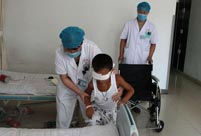While some Asian neighbors are considering whether to enter into one or more economic partnerships, China has vowed for an open, inclusive attitude towards the coexistence of multiple regional and global frameworks of cooperation.
Speaking at the 10th China-ASEAN Expo, Chinese Premier Li Keqiang said China is willing to work with the ASEAN (Association of Southeast Asian Nations) to advance talks of the Regional Comprehensive Economic Partnership (RCEP), and discuss exchanges and interaction with frameworks such as the Trans-Pacific Partnership (TPP) Agreement.
The expo is taking place in Nanning, capital of south China's Guangxi Zhuang Autonomous Region.
The purpose, according to Li, is "to create an open, inclusive and mutually beneficial climate to make the two wheels of regional and global trade roll together."
"For China, a country that continues to seek opening up and cooperation, active participation in cooperative mechanisms will bring more opportunities than challenges," said Lu Jianren, research fellow with the National Institute of International Strategy under the Chinese Academy of Social Sciences.
Lu said regional integration in the Asia-Pacific region will see substantial progress in the next decade, with a number of different cooperative mechanisms flourishing at the same time.
"East Asia and Southeast Asia, two of the world's fastest growing regions, are ready to usher in a multi-framework era," said Liu Jianwen, deputy director at the Institute for Southeast Asian Studies at the Guangxi Academy of Social Sciences.
World trade has been facing many challenges for a number of years. Regional and trans-regional, as well as bilateral and multi-lateral trade talks have gradually become the new trend of international economic and trade cooperation.
Liu said the ten ASEAN member countries are seeking to have a greater say in regional cooperation by expanding the "Ten Plus One" mechanism - similar to the free trade area (FTA) agreement between ASEAN and China - with Japan, the Republic of Korea, Australia, New Zealand and India.
At the same time, the ASEAN-led RCEP talks, engaging China, Japan, the ROK, Australia, New Zealand and India, kicked off in November 2012. Meanwhile, the TPP talks, led by the United States, have brought Vietnam, Singapore and Australia and Japan to the table.
Wang Qin, a senior researcher with Xiamen University, said there is still room for improvement for market openness and consumption levels in the China-ASEAN FTA.
A cooperation mechanism like RCEP highlights the need to broaden and deepen current FTA cooperation, as well as improving the level of openness and expanding market scale. By doing so, competitive Chinese industries can also have larger markets to explore, said Wang.
Xu Ningning, deputy secretary-general of the China-ASEAN Business Council, suggested China upgrade the China-ASEAN FTA by learning from ASEAN's various trade arrangements with other countries.
China and ASEAN should both step up efforts to reduce existing trade barriers and improve the overall level of trade facilitation, according to Xu.
But China's openness to regional frameworks of economic cooperation does not mean a shift of emphasis from global economic and trade cooperation, as President Xi Jinping on Thursday urged the World Trade Organization (WTO) to play a bigger role in safeguarding and consolidating a multilateral trade mechanism.
Regional trade arrangements should serve to supplement and boost multilateral trade rules, Xi said when meeting with Roberto Azevedo, WTO's new director-general, ahead of the Group of 20 Summit in the Russian city of St. Petersburg. Xi stressed that the multilateral mechanism, with the WTO at its core, cannot be replaced by any regional arrangement.
The future world economy will be boosted by both developed countries and emerging economies, said Chen Fengying, a researcher with the China Institute of Contemporary International Relations.
"Strong, sustained and balanced global economic growth could then be expected," Chen added.
 Mountain of garbage in Nairobi
Mountain of garbage in Nairobi Highlights of MAKS 2013 Int'l Aviation and Space Show
Highlights of MAKS 2013 Int'l Aviation and Space Show  10th China-ASEAN Expo opens in Nanning
10th China-ASEAN Expo opens in Nanning Eagle Boy takes to sky to break another record
Eagle Boy takes to sky to break another record 12-year-old boy becomes pillar of the family
12-year-old boy becomes pillar of the family Eye-gouged boy receives blind rehabilitation in Shanxi
Eye-gouged boy receives blind rehabilitation in Shanxi Top 10 naked hotels in the world
Top 10 naked hotels in the world The most gorgeous Chinese women in the eyes of foreigners
The most gorgeous Chinese women in the eyes of foreigners A collection of bizarre rooftop buildings around China
A collection of bizarre rooftop buildings around China Putin intimate contacts with marine animals
Putin intimate contacts with marine animals China's frigate 'Bengbu'in fire training
China's frigate 'Bengbu'in fire training Fresh students 'forced' to register in university independently
Fresh students 'forced' to register in university independently 2013 Taiwan Int'l Tourism Expo kicks off in Taipei
2013 Taiwan Int'l Tourism Expo kicks off in Taipei Photo story: Take a gap year
Photo story: Take a gap year Nokia's Global Headquarters: visiting a declining empire
Nokia's Global Headquarters: visiting a declining empireDay|Week|Month